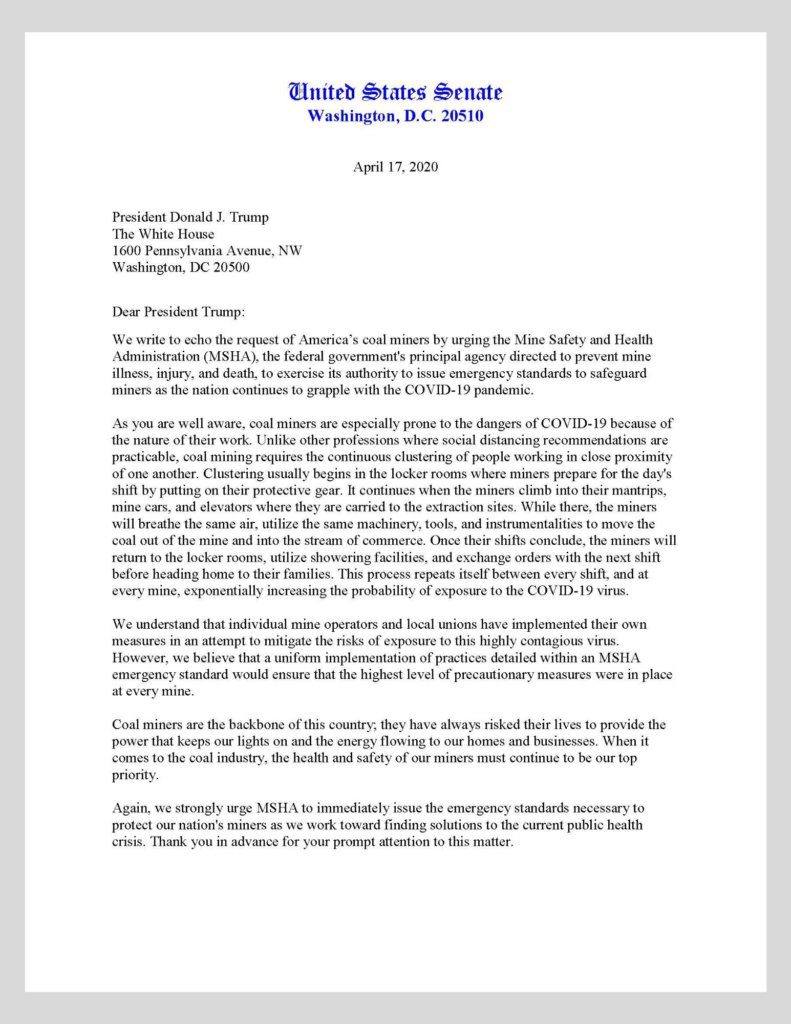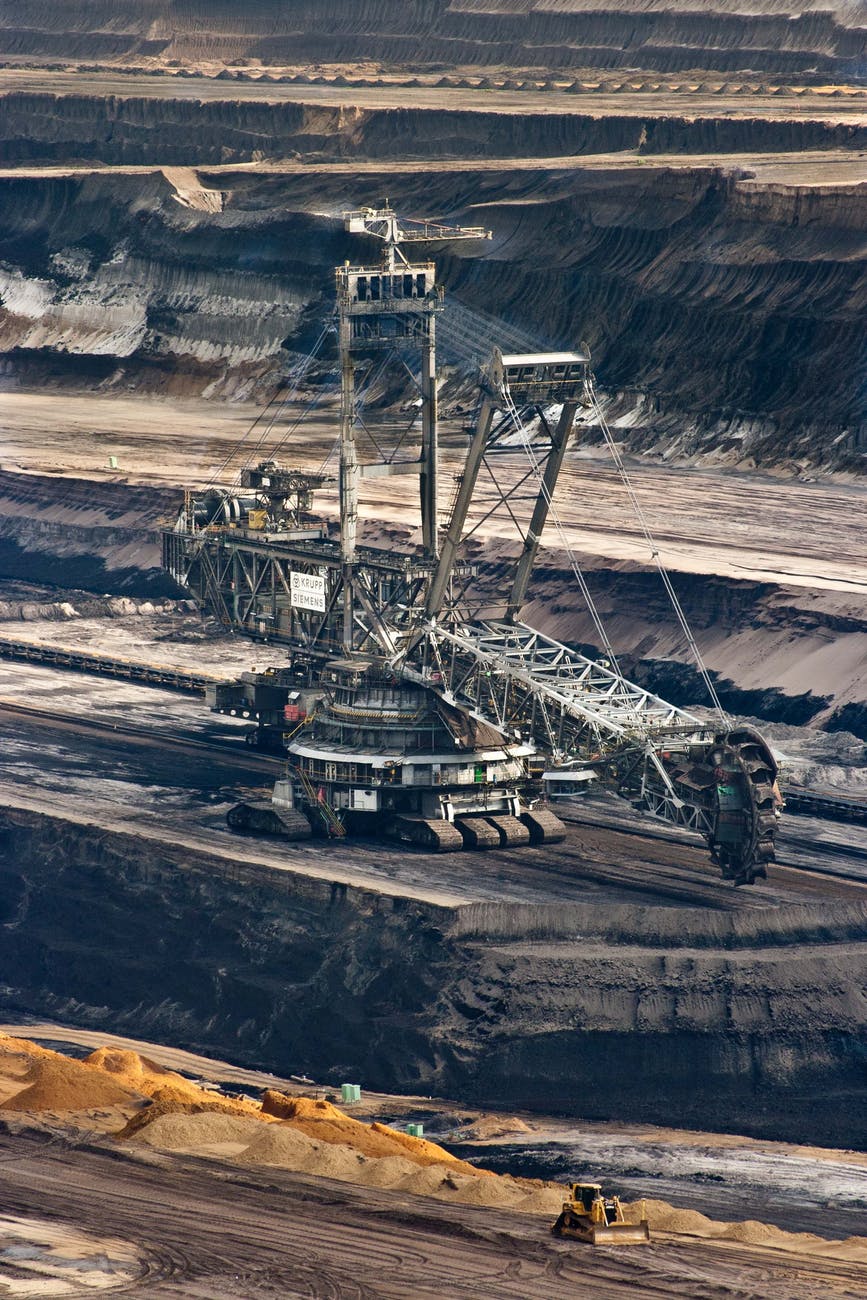Source: West Virginia Record
April 27,2020
CHARLESTON – At least four more unions have rescinded their endorsements of Justice John Hutchison’s state Supreme Court campaign following his vote to uphold the state’s right-to-work law.
Political Action Committees for the United Mine Workers of America, the United Steelworkers, the state branch of the American Federation of Teachers and the West Virginia School Service Personnel Association all announced their decisions to rescind endorsements, just days after the ruling was issued and a day after the state AFL-CIO rescinded its endorsement for Hutchison.
The West Virginia State Council of COMPAC, the United Mine Workers of America’s political arm, said its April 23 vote to withdraw the endorsement was unanimous.
“Since 1890, the core principles of the UMWA have always been to fight for workers’ rights to safe and healthy jobs; to be paid a fair and living wage; to be treated equally no matter their race, creed, gender, faith or color; to speak out on the job without fear of retribution; and to be able to hold their jobs free of favoritism from their employer,” UMWA International President Cecil E. Roberts said in a statement. “So-called ‘Right to Work’ laws, born from racism and discrimination, are a frontal attack on all those principles.
“The West Virginia state legislators who passed this law and the Justices of the West Virginia Court of Appeals who upheld it clearly do not share our principles. They do not think workers should have those rights. We cannot and will not support officeholders at any level of government who believe that.”
The union sent a letter to Hutchison’s campaign informing it of the decision and asking for it’s campaign donation to be returned.
UMWA spokesman Phil Smith said this is first time he remembers such a move.
“I think President Roberts’ statement speaks for itself,” Smith told The West Virginia Record. “We operate and we represent our members with a set of core values that we don’t stray from. We had the assumption that Justice Hutchison shared those values. It was very disappointing.
“For him to say (in his concurring opinion) essentially that he had no other choice than vote the way he did, that is bullshit. It’s that simple. No, he didn’t have to vote that way.”
The USW announced its decision April 24.
“Our union will never back any candidate of any party who fails to support working people,” Billy Thompson, director of USW District 8, said in a statement. “This legislation was designed to help greedy employers lower wages, reduce benefits and eliminate safety protections.
“Voting to uphold it revealed Justice Hutchison’s true colors, leaving us no choice but revoke our support for his candidacy. West Virginia workers deserve elected officials in every office that puts their needs above corporate profits. Unfortunately, John Hutchison is not one of them.”
AFT-WV President Fred Albert said his organization’s Committee On Political Education voted unanimously April 24 to rescind its endorsement.
“Our members deserve someone who supports working families,” Albert told The Record. “But Justice Hutchison’s actions show that he probably isn’t supportive of working families and labor unions.”
He said he couldn’t recall AFT-WV ever rescinding an endorsement before.
“I’ve with the AFT for more than 26 years, and I don’t remember another instance,” Albert said. “It’s very unusual, but these are unusual circumstances.”
The WVSSPA PAC said it overwhelmingly voted April 23 to rescind the endorsement.
“Although school service employees and state employees are not directly affected by ‘Right To Work,’ we feel it is an affront to everyday working West Virginians and places more of our money in the hands of out-of-state corporations,” the group said in its statement posted on its Facebook page. “WVSSPA is not an affiliate of the West Virginia AFL-CIO, through no fault of ours, but we stand with all working-class West Virginians in saying ‘Right To Work’ is wrong.
The justices, in their April 21 opinion, reversed and remanded a 2017 opinion by Kanawha Circuit Judge Jennifer Bailey that said the Workplace Freedom Act unconstitutionally infringes upon the rights of labor unions to associate, as well as their liberty and property rights.
In the 69-page ruling, Justice Evan Jenkins spells out the reasoning.
“We conclude that the act does not violate constitutional rights of association, property, or liberty,” Jenkins wrote. “Therefore, we reverse the circuit court’s contrary rulings and remand this case for summary judgment in favor of the state consistent with this decision.”
Enacted in 2016, the Workplace Freedom Act essentially says a worker may not be required to become a member of a labor organization or pay any dues or fees assessments. The unions say the law amounts to illegal taking because non-union employees would gain the benefits of contract negotiation and other benefits without having to pay. The unions also say federal law already says workers don’t have to join.
The West Virginia AFL-CIO and other unions have fought the law since it before it was enacted in 2016 by the Republican-led Legislature. Then-Gov. Earl Ray Tomblin, a Democrat, vetoed the measure, but the Legislature overrode that veto. That kicked off a court challenge.
Bailey issued a preliminary injunction early in 2017. Soon, the state Supreme Court reversed that preliminary injunction, saying it stacked things against the union. But the makeup of the court was different then.
In February 2019, Bailey issued her final ruling essentially striking down the law. In March 2019, the Supreme Court issued a stay on Bailey’s order so they could hear the case.
West Virginia AFL-CIO President Josh Sword said the law was created “solely to undermine and weaken unions in their efforts to protect workers and represent workers’ rights.”
“Obviously, we’re disappointed in the ruling,” Sword told The Record. “But, we are not all that surprised. We knew the makeup of the court going into this, generally knowing the position they’d have and the result they’d issue.
“Circuit Judge Bailey had rightfully ruled that the so-called ‘Right to Work’ act clearly violates the West Virginia Constitutional rights of unions and individuals with regard to the illegal taking of their property. This law has been the centerpiece of a years-long, partisan-driven agenda by the anti-worker majority to lower wages and benefits and eliminate workplace safety regulations – all in order to place corporate profits far above the health and safety of West Virginia workers, which is shameful particularly in light of the current pandemic we’re facing.”
Sword said the AFL-CIO now will turn its attention to the 2020 election and “hope to make some real changes that way.” That includes rescinding its previous endorsement of Hutchison.
“Justice Hutchison approached our organization and met with many members, seeking our endorsement of his candidacy and our support,” Sword said. “Despite his statements both to us and in his concurring opinion that he values the work of unions, his vote to concur with the politically motivated decision in support of the state’s ‘Right to Work’ law made clear to us that he has put the interests of out-of-state corporations over the interests of West Virginia working families.”
It was a concurring opinion, but Hutchison didn’t seem to give it an overwhelming endorsement.
“The law dictates that I must concur because the gist of the majority opinion is true: what the Legislature gives, the Legislature can constitutionally take away,” he wrote. “No other court in America has found a right-to-work legislative enactment unconstitutional, and the majority opinion has done nothing different.”
Hutchison said he has studied past right-to-work challenges, including countless U.S. Supreme Court, state court and federal court cases.
“With almost clarion unity, courts repeatedly hold that legislatures may give rights to unions and can just as quickly take those rights away with constitutional impunity,” he wrote. “The (West Viginia Supreme) Court acknowledged as much in 2017, saying that ‘27 other states have adopted right to work laws similar to West Virginia’s, and the unions have not shown a single one that has been struck down by an appellate court.’
“(That Supreme) Court hinted that the unions’ lawyers needed to come up with better legal arguments.”
But, Hutchison said he doesn’t there this is a better argument.
“I now think the solution lies in the ballot box, not the courtroom,” he wrote. “Having taken a constitutional oath as a justice, it is my sworn duty to uphold the law. I am, therefore, compelled by the law and my obligations as a justice to respectfully concur with the majority opinion.
Through state Supreme Court spokeswoman Jennifer Bundy, Hutchison said he cannot comment on anything related to the case, adding that “his concurring opinion spells out his position.”
Sword said Hutchison’s words and his vote didn’t hold water, but said he also thinks the solution lies in the ballot box.
“Here’s the way I see it,” Sword told The Record. “I’m going to use a legislative analogy. We have delegates and senators take to the floor and speak passionately about things every day during the session. In many cases, it lays the foundation on how they’re going to vote. You can get up and say whatever during the session, but we’re for working people or against working people.
“What Justice Hutchison did in his concurring opinion was that he essentially took the floor and gave a speech about how great unions are and how important they are. But when it came down to it, he voted against working families of West Virginia.”
Noting Justice Margaret Workman’s concurring and dissenting opinion as well, Sword said it’s unfortunate the more conservative balance of the court comes into play, especially on a decision like this.
“(Hutchison and Workman) know the makeup of the court better than anyone,” Sword said. “This issue (right to work legislation) has been politicized all over the country for decades, like a woman’s right to choose and Second Amendment rights.
“We saw a political decision from anti-worker Supreme Court majority.”
All three of the Supreme Court races are non-partisan. The Division 1 and 2 races are for regular 12-year terms on the Supreme Court. The Division 3 race is to fill the seat formerly held by Allen Loughry. Gov. Jim Justice appointed Hutchison to fill that seat in December 2018. The term for the Division 3 seat will end in 2024
Hutchison is seeking re-election for the Division 3 seat. He was appointed after former Justice Allen Loughry resigned. The term is to finish the rest of Loughry’s term and will end in 2024. Charleston attorney Bill Schwartz and Fifth Circuit Judge Lora Dyer also are running for the seat.
For the Division 1 seat, incumbent Justice Tim Armstead is being challenged by former Justice Richard Neely and northern panhandle Circuit Judge David Hummel.
Running for the Division 2 seat currently occupied by Workman are Putnam County Assistant Prosecutor Kris Raynes, Kanawha Circuit Judge Joanna Tabit, Kanawha Family Court Judge Jim Douglas and former legislator and Supreme Court candidate Bill Wooton. Workman is not seeking re-election.
In 2018, Tabit finished third in a special election for two seats on the Supreme Court left by the retirements of Robin Jean Davis and Menis Ketchum. Armstead and Justice Evan Jenkins, both of whom had been appointed by Justice to temporarily fill those seats, won those elections. Douglas, Wooton and Schwartz all ran in the 2018 election as well.
The non-partisan court election is part of West Virginia’s primary election, which has been rescheduled for June 9 because of the Coronavirus pandemic.
Written by: Chris Dickerson






